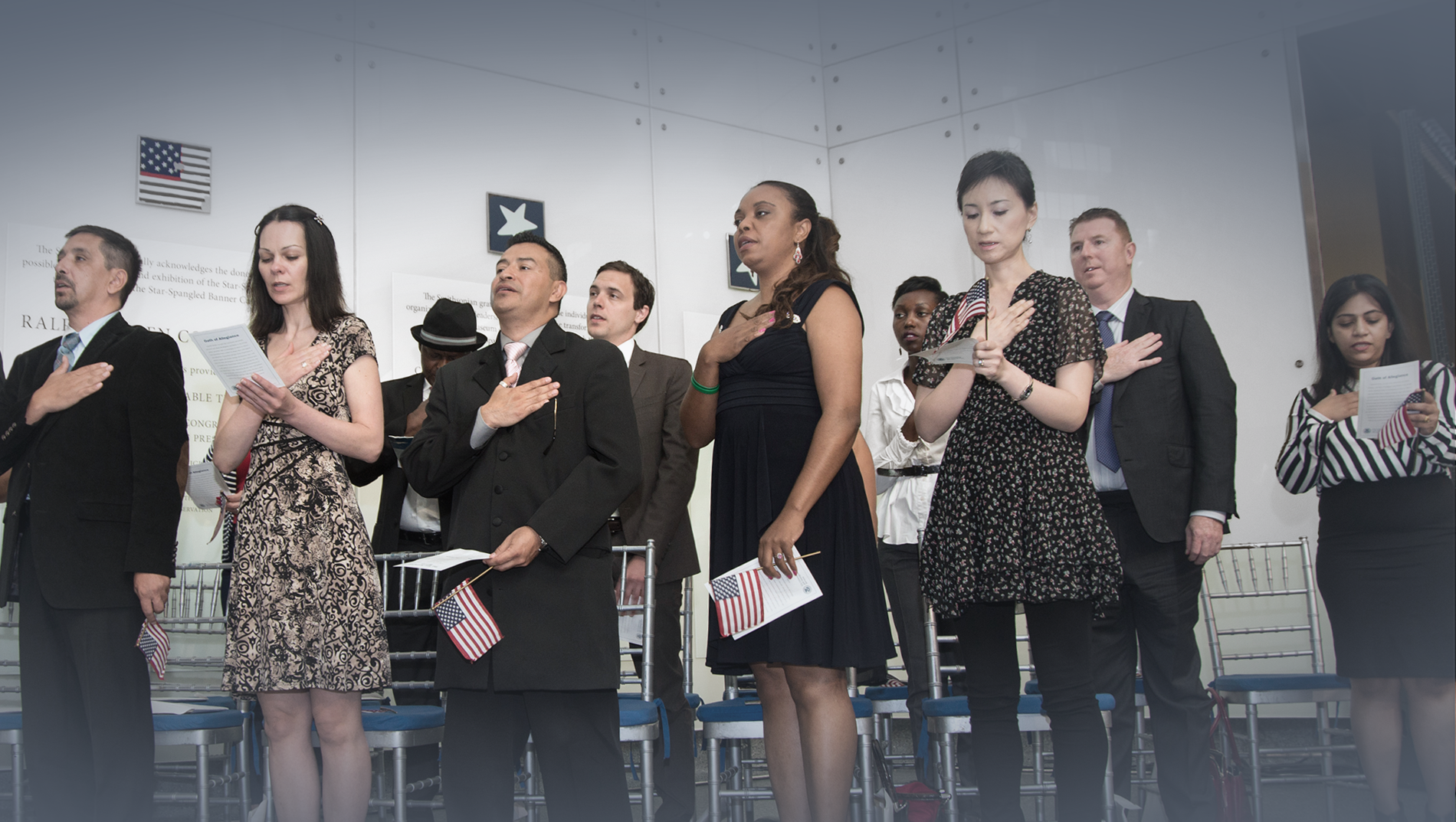Immigration 101
The U.S. immigration system is complex and can be difficult to understand. These resources provide key data points, historical information, and background on hot topics in immigration. Learn the basics about immigration. Immigration in the United States is complex and ever-evolving. Start here to understand the fundamental aspects of immigration policy, its history, and its impact on both individuals and the country at large. Learn commonly used terms about immigration law and how the U.S. immigration system is designed. Explore layered topics like how and whether immigrants can become citizens, as well as what individual protections look like under the law.
How the United States Immigration System Works
- How the Immigration System Works
- June 24, 2024
U.S. immigration law is very complex, and there is much confusion as to how it works. This fact sheet provides basic information…
Read More
Birthright Citizenship in the United States
- Birthright Citizenship
- October 16, 2024
This fact sheet explains birthright citizenship, the Fourteenth Amendment, and its interpretations. Who is…
Read More
Asylum in the United States
- Asylum
- August 27, 2014
Asylum seekers must navigate a difficult and complex process that can involve multiple government…
Read More
SB 1070 “Gets Tough” on Arizona’s Housing Market
With only six weeks until Arizona’s immigration enforcement law goes into effect, area housing analysts are already expecting the worst. According to the Arizona Republic, housing experts anticipate that SB 1070 will not only drive illegal immigrants out of the state, but legal residents and potential new homebuyers with them—“departures from a state where growth is the economic foundation.” The resulting exodus will likely spur more foreclosures and create more vacant homes and apartments, which as real-estate analysts point out, will scare off potential homebuyers who fear lower home values. With a budget deficit of $4.5 billion and an economy struggling to get back on its feet, a declining housing market is the last thing Arizonans need. Read More

Reality at the U.S. Mexico Border
Washington D.C. – On Monday, the Immigration Policy Center (IPC) hosted a teleconference with border and national-security experts who dissected the myths linking immigration and border violence. These experts shared their analyses of the reality of crime and violence along the U.S.-Mexico border, what the real sources of… Read More

The Anti-Immigrant Movement and the Politics of Exceptionalism
The capacity of these groups to stymie attempts to reform our broken immigration system should not be underestimated. Read More

Conflating Immigration and Climate Change: When Wedge Issues Collide
Today in Politico, hard right, conservative Gary Bauer continues the restrictionist tradition of blaming immigrants for everything from pot holes to climate change. In his editorial, Bauer cites a 2008 report by the restrictionist group Center for Immigration Studies and seeks to link climate change legislation and immigration reform legislation (and a half dozen other ideas for which he advocates) to make the wholly unclear point the immigrants are once again to blame for our environmental problems. Read More

1,200 National Guard Troops to the Border: A Bargaining Chip or More Political Pandering?
Yesterday, President Obama met with Senate Republicans to discuss, among other things, moving forward with comprehensive immigration reform. But what came out of the meeting was a letter to Senator Carl Levin, Chairman of the Armed Services Committee, requesting 1,200 troops to be sent to the U.S.-Mexican border and a $500 million request for additional border personnel and technology as part of the Emergency Supplemental Appropriations Bill. While the President’s intentions to address the real sources of violence and crime along the border—that is, drug cartels and gun traffickers, not immigrants—is duly noted, the President is being perceived as piling enforcement on enforcement and pandering to Republicans with no real forward movement on reform. Read More

Riding the Anti-Immigration Wave: The Short- and Long-Term Political Implications
Despite the mounting pressure (boycotts, legal challenges, protests) to repeal Arizona’s enforcement law (SB 1070), polls indicate that the majority of Americans support the law by almost two to one—and, at last count, as many as 17 other states are considering similar legislation. However, while it may seem advantageous for some in the GOP to use this anti-immigrant wave as political momentum for re-election, the long-term political impact may be larger and more harmful than they realize. Can the Republican Party (once the 'Party of No," then the "Party of Hell No" and now the "Party of Papers Please?") really afford to further alienate the fastest-growing U.S. voting bloc—Latinos? Read More

U.S. Border Enforcement Prioritizes Non-Violent Migrants Over Dangerous Criminals
Washington D.C. – The Mexican President’s visit to the United States allowed both he and President Obama to address the important issues of immigration, border control and crime. Both Presidents made the important point that we address and not conflate these serious issues. This approach stands in stark contrast to… Read More

2010 Congressional Primaries, Immigration and an Appetite for Change
As the dust is settling from yesterday’s primary elections, many politicians and pundits will try to interpret what the American public is thinking. The reactions and responses are likely to span the ideological and political scales. Whether Democrats aren’t Democratic enough, or Republicans aren’t Republican enough, or seats held by one party should be replaced by the other, one thing is clear: Americans are frustrated with their current leaders and want new representation. Read More

Restrictionist Group Blames Immigrants for Teen Unemployment
In a new report, the Center for Immigration Studies (CIS) attempts to blame immigrants for the declining share of native-born teenagers in the United States who join the U.S. labor force during the summer months. However, in its rush to blame immigrants, CIS completely overlooks an even more important factor that has fueled declining labor-force participation rates among U.S. teenagers over the past decade and a half. As the Economic Policy Institute (EPI) notes in a policy memo, a “startling omission” from the CIS report is the fact that school enrollment among teenagers “has dramatically increased, even in the summer. This increase more than makes up for the decline in teen employment.” In other words, many teenagers are staying out of the job market not because immigrants are out-competing them, but because they are getting an education. CIS should be applauding this fact given that education is critical to the eventual labor-market success of U.S. teenagers. Read More

Polls Show Americans Want Broken Immigration System Fixed
Two new public opinion polls reveal that the majority of the American public believes the U.S. immigration system is broken, and that fixing it should include the creation of a pathway to legal status for unauthorized immigrants already in the United States. The polls, conducted by the New York Times/CBS News and USA Today/Gallup, indicate that Americans are deeply frustrated over unauthorized immigration and the dysfunctional U.S. immigration system that fuels it. Yet most of the respondents in both polls don’t believe that a get-tough, enforcement-only, deport-them-all strategy towards unauthorized immigrants is the best way to move forward. This should be heartening news to advocates of comprehensive immigration reform who understand that smart and targeted immigration enforcement must be coupled with a thorough revamping of our immigration system in order to be effective. Read More
Make a contribution
Make a direct impact on the lives of immigrants.

